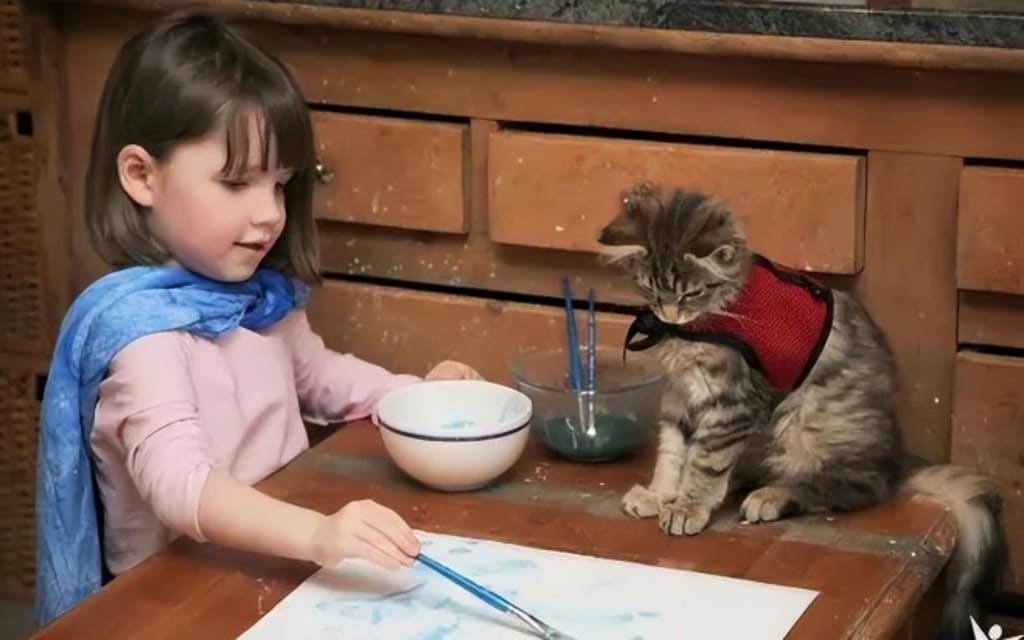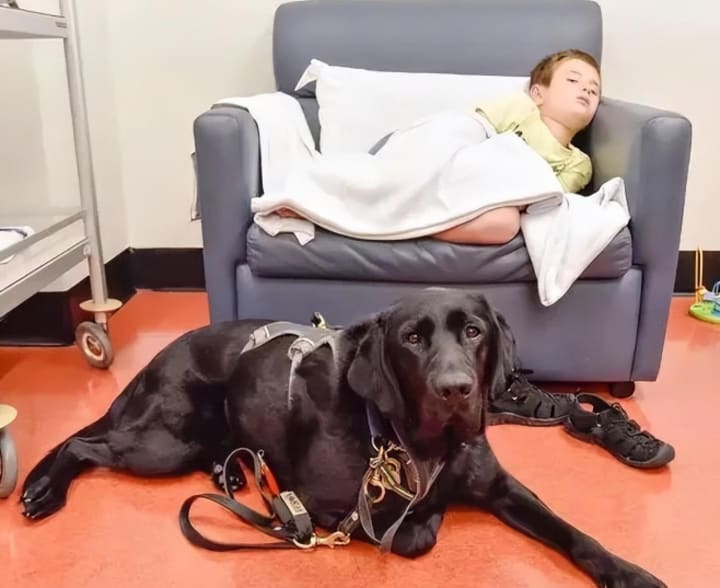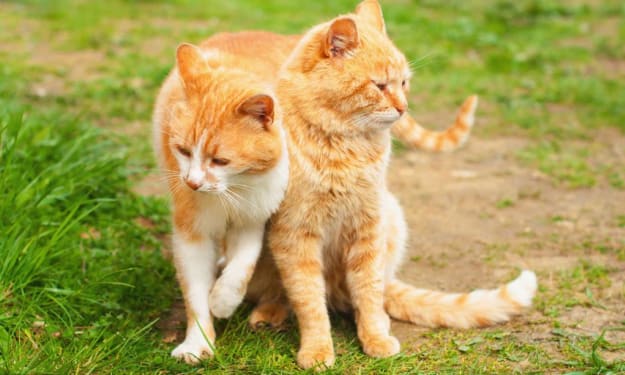
Small animalssagreementtonlychildrennaturallyl playmates, but also the child's mind "masseur"! Iris Grace, a British autistic painter, gradually opened her heart because of her Maine cat.
At the age of two, Iris could not speak and rarely made eye contact with others. When her parents took her to the doctor, it was diagnosed that Iris had autism. Her language, social and learning skills were slower than the average child's, and she was unable to interact with people or make eye contact. Crowds would drive her crazy, and she would even push away her beloved loved ones and lock herself in silence.
To treat Iris, her parents and therapist tried many therapies and researched everything they could, but unfortunately, nothing worked well. Since the normal methods were exhausted, they decided to take some other approaches, such as trying small animals.
So they tried puppies and horses first, but Iris didn't like them. By chance, she discovered that Iris was not resistant to cats. So when she posted on Facebook asking for the best cat breed, many of her friends suggested "Maine cats" - large, long-haired cat of North American origin with friendly, intelligent, quirky, and active personalities.
When the parents brought Thula home from the local breeder, the furry kitten slept on Iris's shoulder the first night, and Iris seemed relaxed around Thula, stroking her ears and whiskers from time to time. Thula also didn't mind when Iris held Thula's tail. The two little creatures have since become inseparable, intertwined and inseparable.
The presence of Thula opened Iris's heart, and thus, a painting belonging to Iris was born, and the title of "Little Monet" resounded in the painting world.
In fact, from the above case, we can see that small animal do help some autistic people to alleviate their emotional disorders.
Just like the woman in this story, this autistic person can't help but pound her head when she gets anxious. When she started to lose control, her service dog would immediately run to her and tuck her head into her arms for a cuddle, the fastest and most effective way to distract and calm her down.
This autistic boy, James, from New Zealand, was diagnosed with autism at the age of 12. He was sensitive and afraid of being around people. He had no friends even at school and had trouble communicating with his family.
Fortunately, he has his closest and best friend, a faithful Mahe, who stays close to him. As Mahe is trained, so when Jame appears nervous and anxious, Mahe will only lean on the side, trying to find ways to keep Jame calm, so that he does not accidentally get lost or in danger.
And, when James has a seizure, Mahe will immediately bark or whimper to tell his family. Once, when James needed an MRI at the Wellington Children's Hospital due to epilepsy, Mahe also stayed close by and even went to the bed with James with the doctor's permission, hoping to give a little peace of mind to his master who was under general anesthesia.
As you can see, these warm and fuzzy guys have become the best companions for children, and there are many other kinds of service dogs besides pets. For example, guide dogs, hearing dogs, mobility assistance dogs, physical assistance dogs, diabetes alert dogs, mental health service dogs, etc. In addition, the gentle nature of cats has a natural healing effect.
Scientists at the Center for Research on Human-Animal Interactions at the University of Michigan School of Zoology co-authored such a research paper in the medical journal Pediatric Nursing.
Before the trial, researchers explained why cats were selected for the study: they are a quieter, more interactive companion animal than dogs, and may be a good choice for children with autism and less of an effort for parents.
For this trial, researchers recruited more than 500 families of children with autism between the ages of 6 and 14 and selected 11 families who met the criteria to adopt a docile kitten for 18 weeks of monitoring.
At the end of the study, parents were asked to fill out a questionnaire to analyze the impact of cat ownership on children's social skills and anxiety. The results, based on feedback from participating families, showed that a bond quickly developed between the children with autism and the cats and that this bond helped to increase the children's empathy and reduce their separation anxiety.
Parents ask: "The little animals are so cute and cuddly! Can I get one for my child? " The answer: "It varies from person to person."
We can see from the reports that small animals have this and that effect on children's companionship, but we should not "deify" the effect too much. As of today, there is no research to suggest that "animal therapy" has a systematic effect on autism itself. Therefore, parents must be rational about keeping animals.

No.1 Not all children are suitable to have animals
The first thing to do is to analyze whether or not your child likes animals. After all, some children have emotional and stress reactions to animals, so if you don't do your best to keep them, I'm afraid it will have the opposite effect.
We have also done some research on animal ownership among parents, and our old friend "Doudou's mom" has a different view.
Doudou's mother: My family has had a pet dog, rice cake, for eight years, so it can be said that Doudou has had a pet dog company since birth. The only contact between them was when Doudou held a rope and twitched it in front of MiGao's eyes, and MiGao looked on cooperatively. Other than that, I can't remember any other interaction between them.
It is reasonable to say that all children like small pets, but do not Doudou like them? I found that she likes to watch chickens and ducks but not in a very obvious way. But there is a problem: chickens and ducks don't interact, at best they can only play chase games with them, and the spectrum kids themselves have the little acting ability, so Doudou's fondness for chickens and ducks is purely for watching.
Here, I recall a very interesting phenomenon. When Doudou was watching Peppa Pig, my cousin said, how can talk are mammals, chicks only deserve to be chicks. Haha. The truth of nature, mammals are just more enthusiastic. That's why horses, dolphins, and puppies are among the therapies for autism and are accepted by many people. But the prerequisite is that the child's ability to pay attention has to come up, otherwise anything in front of him in front of the eyes is a falsehood.
What do you think about animal therapy?
Simply put, if you expect a dog in the house to improve your child's autism, it's probably a pipe dream. Autism does not actively focus on the outside world, only the outside world can actively pull them in, and as parents, we are the ones with that active pull. A dog, a horse, can interact, but they can't actively pull together. So, if you have a dog in the house that can be your tool, and you can actively pull in and coordinate the relationship between that dog and your child, then you can try to let them play together with your assistance. However, it is indeed a challenging job, and you have to juggle the dog than play with the child alone.
I have to say, Mama Doudou has a very pragmatic idea. You have to take care of your energy and finances while taking care of your fur baby, after all, it's a living, breathing creature!
No.2 If you have a furry animal
Well, for those babies who have an affinity for animals, and are even willing to play with them, in the exercise of the child's ability, but also to let the child reap the benefits of a "furry" wrapped in a good childhood.
So, if you are ready and intend to raise a small furry child, parents must pay attention to the following points: 1.
1. Regular channels to buy
Just buy a small animal home? Don't do this. Please parents choose the regular, qualified institutions and stores and must have a health certificate of the dog to be reassured!
2. Do vaccinations and medical examinations
After choosing your favorite animal, you need to do is immediately take it for a medical examination and vaccination. This is not a once and for all thing Oh after you have to be regular vaccinations and health checks.
3. Hygiene should be done
Regularly bathe the small animal, clean up the hair, etc., to prevent the small animal from growing lice, regular cleaning and disinfection, clean up residual feces, hair, dander, etc., to prevent the induction of allergies or the spread of disease.
4. Avoid close contact between baby and dog
You can buy some toys for the dog and let the dog play with itself to be. Try not to let the baby and the dog play, especially do not use your hands to feed the dog to avoid being bitten or scratched by the dog.
5. Punish the pet to avoid the baby
The dog messed up the house again? Try to be tolerant. I am really angry and must punish it. Then take the dog to another room, do not punish the dog in front of the baby, or it may be angry with the baby, and the baby to attack.
6. necessary training for the dog
We also need to train the dog in the right way, teach the dog some language skills, and teach him to understand your words, especially sit, lie down, stop and walk, so that the dog understands the owner's intention to obey the command.
7. In case of a bite, parents do this
If bitten or scratched by an animal, there is a break in the skin, cracked, or even injured tendons and ligaments, etc., must be treated promptly.
Doctor's advice: If it is a superficial wound, first rinse it repeatedly with 20%, soapy water for 20 minutes, topical hydrogen peroxide, saline rinse the wound, and finally disinfect the wound with iodophor. Superficial wounds are exposed as much as possible without sutures and dressings so that bacteria are less likely to multiply and grow and the wound is more likely to heal. If it is a deeper wound, once the wound bleeds a lot, in addition to the above steps to clean, but also pressure bandage the wound, immediately go to the hospital for wound debridement, suture, injury to the tendon, the need to perform tendon anastomosis. After the operation, antibiotics should be applied, tetanus antitoxin should be injected, etc.
And, whether it is a superficial wound or a deeper wound, go to the epidemic prevention department within 24 hours for rabies vaccination, and for deeper wounds, also inject rabies immune serum around the wound to prevent the occurrence of rabies, yo!
The above precautions, please parents to remember and collect!
In short, the choice of raising animals is left to parents, after all, this is not a trivial matter. A moment is like, a life that is not abandoned is the responsibility. And for the blowing of the fabulous pet therapy, we must look at it calmly.
Finally, I hope that each baby can reap the benefits of their own growth ~
About the Creator
Miley
Wherethereisawill,thereisaway.






Comments
There are no comments for this story
Be the first to respond and start the conversation.